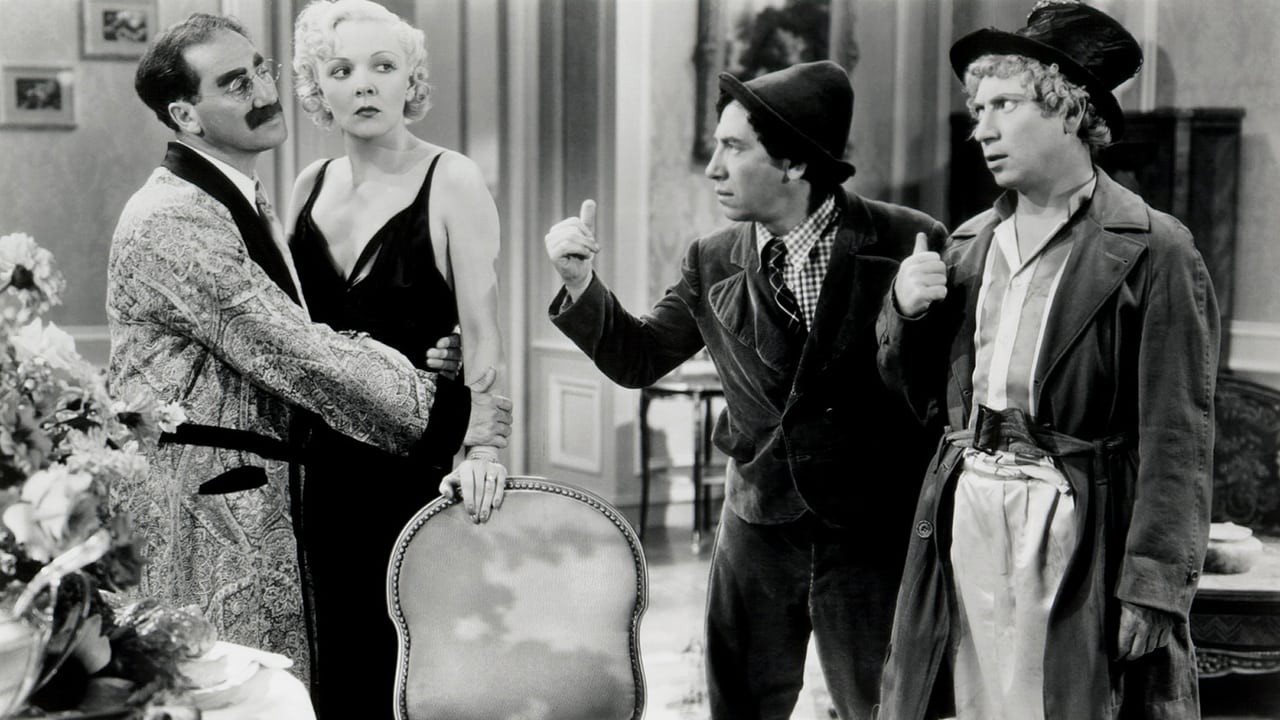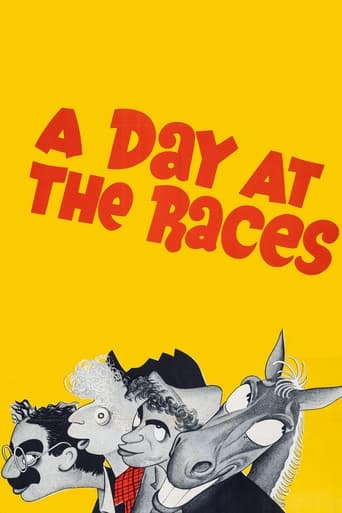

I really like The Marx Brothers. At the height of their popularity (between 1935-1945), Groucho, Harpo, Chico, and, sometimes, Zeppo (always playing the straight man), were one of Hollywood's funniest comedy teams, ever. Their unique brand of humour (a zany mix of slapstick, absurd situations, and racy innuendo/word-play) is genuinely hilarious, even when judged by today's standards.When The Marx Brothers were good, they were very, very, good. Indeed. But when they weren't so good - Well - Their wit and charm floundered somewhat, just as it did here in 1937's "A Day At The Races".A good part of this flick's problem can easily be blamed on there being way too much focus put on a boring romance. And this left The Marx Brothers out of the picture's limelight far too often.In "A Day At The Races" - Groucho, Harpo, and Chico (as characters Dr. Hackenbush, Stuffy, and Tony, respectively) try to save Judy's Health Sanatorium from being turned into a Casino by the ruthless villain, Morgan.This flick also contains a really splendid musical number that includes about 30 black performers whose ages ranged from about 5 to 40. It really rocks.
... View MoreDr Hugo Z Hackenbush is the new chief of staff of Standish Sanitarium, owned by Judy Standish. The Sanitarium has fallen on hard times and a wealthy banker, JD Morgan, is attempting to take it over and turn it into a casino. Judy's boyfriend, Gil Stewart, aims to save the Sanitarium by winning a big race with his horse, Hi-Hat.Another Marx Brothers classic. As always, the highlights are Groucho's one-liners, but Harpo's clowning is a treat too. It's not all good though. The plot drifts, and gets more absurd, in the second half. Also contains a fair amount of padding - the musical numbers were unnecessary (except for Chico's piano solo, which was brilliant, and Harpo's subsequent playing of the piano until it is a harp!). Plus, some of the skits went on beyond their punchline.
... View MoreA Day at the Races is a bit of a strange yet magical bird of a comedy. There's that ten minute musical sequence (or I should say two of them but they end up connecting, sort of), which is equal parts the-bland-Prince-sings-to-Disney's-Snow-White (remember that, nope, me neither) and just 'um, a musical number with black people that's not insulting to them in the 1930's and on its own separate from the movie is exhilarating but has a moment of blackface... this is ODD, and I say this while watching a MARX BROTHERS MOVIE.' It's the one thing in this that brings the movie to a screeching halt, and this includes a rather long and elaborate dance/musical set piece in a nightclub which includes ladies dancing around a fountain, Groucho doing an intricate (and hilarious) dance with Margaret Dumont while he's actually talking to the other lady, and includes Chico and Harpo playing piano and then harp (the latter by some miraculous comic accident) that's part of the suspense of the scene. So that actually works.But aside from that, it's one of their best films despite the fact (or in spite of the fact?) that it has an actual plot, for the most part. Normally the Marx's don't work too well with plots, they operate on creating anarchy in the loosely-knit together scenes and scenarios given to them (not that the writers ever tried to stretch TOO far, they didn't have to, which was fine). Here it's set amid horse races and a horse doctor (Hackenbush, Groucho of course) who is thrust into having to pretend to be a real doctor while also dealing with a race- betting chizzler (Chico with his many, many, many books in an ice cream box), and Harpo as a wayward jockey. Oh and there's a couple who may have to owe some money and some other characters and blah blah blah.It may not sound like a terrific film, and if there's another small mark I can make against it from being a super-mega-all-time-classic instead of just being really-really-really good is that a few times the Groucho lines weren't hitting as *fast* as they usually do, with the pep that they came with the Duck Soup/Animal Crackers days. But this is a nitpick when seeing these guys play off one another - the scene where Groucho checks out Harpo ("Either he's dead or my watch stopped"), or get into elaborate comic set pieces (when Groucho just completely acts a fool as Hackenbush, with the help of Chico and Harpo, when examining Margaret Dumont in front of other doctors). They're pros given good material and elevate it into the world of smart, devilishly-clever delivered lines and Harpo with that finale involving the horse race (where will the horses, and their jockeys, or people looking for parking, end up next!)A Day at the Races is a near classic, though that still makes it a notch above most comedies made in the 1930's. It has its lulls, but somehow, almost despite the usual limitations of an 'okay' roster of supporting actors (no one's outright bad, they're just... there, with the exception of Dumont and the one blonde Groucho gets to play off of in that hotel room scene). The way I might compare it is if you're a fan of Bruce Springsteen and you go to one of his concerts, and there's that section he does the slower folks stuff (some may like it, I don't), and it's a drag... and then there's the rest of the four hours of the concert where he rocks out with his anthems and gems.
... View MoreI rate A DAY AT THE RACES a 10 only compared to other non-Marx comedies (as critic James Agee remarked, the worst the Marx's might do would be better worth seeing than almost anything else). As a Marx Brothers movie it's bogged down by long, pointless musical numbers (I'll contradict myself in a moment) and a sappy romantic subplot (remnants of the formula Irving Thalberg devised for the boys in NIGHT AT THE OPERA, but with Thalberg dead it's all formula now and not much else). Then about two thirds of the way through something nearly miraculous happens. The brothers cut lose with the fabulous examination scene, exhibiting all the anarchic genius that made them great, and then following Allan Jones' cloying rendition of "Tomorrow is Another Day" Harpo grabs a flute and goes tootling off to some sort of African American shanty town where he encounters Ivie Anderson, The Crinoline Choir, and Whitie's Lindy Hoppers and the movie just explodes with energy. Many people, as has been pointed out, would consider this sequence "politically incorrect" but since political correctness is mostly the knee-jerk application of 21st century standards to earlier eras that the critics know nothing about I say screw 'em. For maybe ten minutes or so the screen is filled with so much warmth, talent, and exuberance that it nearly brings tears to my eyes. Sure it's got nothing to do with the story and little to do with the Marx Brothers but it is greatness unto itself and it may be the best scene in the movie. And by the way, for those who insist on judging this movie in racial terms the message seems to be that rich white men (Douglas Dumbrille and his flunkies) are evil and heartless and poor black people know that life is about singing and dancing and having fun. Sounds good to me.
... View More